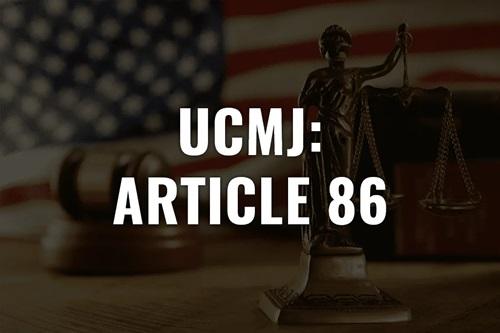Article 86 UCMJ: Understanding Absence Without Leave and Its Consequences
In the United States military, discipline and accountability are essential to mission readiness and unit cohesion. One of the most frequently cited offenses under the Uniform Code of Military Justice (UCMJ) is Article 86 UCMJ, which addresses the crime of Absence Without Leave (AWOL). Service members are expected to maintain strict adherence to duty schedules, reporting requirements, and assigned responsibilities. When these expectations are not met, the consequences can be serious. This blog explores the meaning, implications, and penalties associated with Article 86 UCMJ.
What Is Article 86 UCMJ?
Article 86 UCMJ covers situations where a service member fails to be at their appointed place of duty at the required time. This includes leaving a duty station without permission, failing to report to formation, or remaining absent for an extended period. Unlike desertion, which involves intent to leave permanently, AWOL typically refers to temporary absence without authorization.
The law is designed to ensure that military operations continue smoothly. Every role in a unit contributes to mission success, and when one person is missing, it can disrupt the entire team’s efficiency.
Types of AWOL Under Article 86 UCMJ
Article 86 details several categories of absence, each carrying unique implications:
-
Failure to Go to Appointed Place of Duty
This occurs when a service member does not show up for duty at the designated time and place. -
Going From Appointed Place of Duty
A service member arrives at their duty location but leaves without proper authorization. -
Absence From Unit, Organization, or Place of Duty
This includes longer AWOL periods where the service member leaves the base, ship, or installation without permission. -
AWOL for More Than 3 Days
The severity increases significantly when a service member is absent for three days or more. -
AWOL Terminating in Apprehension
When a service member is caught and returned to duty, the consequences may be more severe.
These distinctions help determine the level of punishment and reflect the seriousness of the conduct.
Why Article 86 UCMJ Matters
The military relies heavily on structure, discipline, and dependability. Every service member plays a role in maintaining operational readiness. Article 86 UCMJ ensures that members understand the importance of their duties and the repercussions of failing to fulfill them.

AWOL behavior affects more than the individual—it impacts:
-
Unit morale
-
Mission effectiveness
-
Trust within the chain of command
-
Safety of other service members
Because of these factors, the military enforces strict penalties for violations.
Consequences of Violating Article 86 UCMJ
Penalties for AWOL depend on the length and circumstances of the absence. Some potential consequences include:
-
Extra duty
-
Restriction
-
Reduction in rank
-
Forfeiture of pay
-
Confinement
-
Bad conduct discharge (in serious or repeated cases)
A short, unauthorized absence may result in nonjudicial punishment under Article 15. However, prolonged absences or repeated violations can lead to a court-martial.
AWOL vs. Desertion: Key Differences
Although they are sometimes confused, AWOL and desertion are distinct offenses:
-
AWOL: No intent to abandon military service permanently.
-
Desertion: Intent to leave permanently or to avoid hazardous duty or deployment.
Understanding the difference is crucial because desertion carries far more severe penalties.
How Service Members Can Avoid Article 86 Issues
To avoid violations of Article 86 UCMJ, service members should:
-
Communicate with leaders if facing personal or medical challenges
-
Request leave or permission through proper channels
-
Understand their duty schedule
-
Maintain accountability at all times
The military also provides support systems to help service members manage stress, personal issues, and mental health challenges that may otherwise lead to AWOL behavior.
Conclusion
Article 86 UCMJ plays a vital role in maintaining discipline and accountability within the Armed Forces. Absence Without Leave may seem minor, but its impact on unit readiness and mission success can be substantial. By understanding the importance of duty, communication, and military structure, service members can uphold the standards expected of them and avoid the consequences associated with AWOL violations.
- Art
- Causes
- Crafts
- Dance
- Drinks
- Film
- Fitness
- Food
- Spellen
- Gardening
- Health
- Home
- Literature
- Music
- Networking
- Other
- Party
- Religion
- Shopping
- Sports
- Theater
- Wellness


